When we think of mobsters, we tend to think of old-timey guys in hats and coats wielding Tommy guns around the time of Prohibition.
But one of the most notorious organized crime bosses in modern memory started his criminal career in 1943 and wasn’t stopped until 2011.
Who was Whitey Bulger?
Born James Joseph Bulger Jr., the man who law enforcement officials nicknamed Whitey Bulger was arrested for the first time when he was just 14 years old. By then, he already had a reputation as a tough kid who was fiercely loyal to his native South Boston.
He spent the next few years in and out of juvenile reformatory for charges including assault, forgery, and armed robbery, and by 1956 he was serving his first stint in federal prison, during which time he became a victim of the CIA’s secret MK-ULTRA program.
After serving 9 years in prison, Bulger was granted parole in 1965, and he spent the next 46 years as a free man, despite his numerous criminal enterprises over that time. Shortly after his release, Bulger became involved with the Killeens, a South Boston gang. He rose through the ranks and, by 1972, he was the Killeens’ representative in mediating a truce with a rival gang.
The Winter Hill Gang
The truce made the Killeens part of the larger Winter Hill Gang, which Whitey Bulger would be running by 1979. Around this same time, Bulger was being groomed by the FBI to become an informant.
According to the agent who claimed to have recruited Bulger, the FBI offered to help Bulger and his gang against other organized crime groups, to which Bulger replied, “Alright, if they want to play checkers, we’ll play chess.”
Regardless of the details, playing informant to the FBI was obviously beneficial to Bulger, who stayed out of jail while receiving useful information from federal agents in exchange for his own information against criminal rivals.
While rumors of this arrangement dogged both Bulger and the FBI for years, it was not until 1988 that Bulger’s status as an informant became public knowledge, thanks to reporting by the Boston Globe’s “Spotlight” team.
Subsequent investigations found that the FBI had mishandled the case and had essentially been supporting Bulger’s criminal enterprises for years, leading to the arrest of his handler, FBI agent John Connolly.
By then, however, Bulger had already been in charge of the Winter Hill Gang for most of a decade, and it was not until 1994 that a warrant was finally issued for his arrest on RICO charges.
This eventuality was one that Bulger had been preparing for, and he fled Boston before he could be arrested, spending the next 16 years as a fugitive, 12 of them on the FBI’s Ten Most Wanted Fugitives list, right behind Osama bin Laden. He was featured on the TV series America’s Most Wanted 16 times before his capture.
Finally, in 2011, Bulger was arrested outside his apartment in Santa Monica, California. He was 81 years old at the time. Faced with a dizzying array of charges including racketeering, extortion, money laundering, and complicity in 19 murders, Bulger was eventually found guilty on 31 different counts, including involvement in 11 different murders.
He was sentenced to two consecutive life sentences—but he didn’t serve them for long.
How did Whitey Bulger die?
On October 30, 2018, a wheelchair-bound Bulger was transferred to the United States Penitentiary, Hazelton in West Virginia. Within hours of his arrival, he was beaten to death by other inmates.
Paul DeCologero, Fotios Geas, and Sean McKinnon were charged with “conspiracy to commit first-degree murder” in relation to Bulger’s demise.
Whitey Bulger’s notoriety, his long career, his status as an FBI informant and the scandal surrounding that revelation, his successful life as a highly-sought fugitive, and his ultimate conviction and death guarantee that he is one of the most recognizable names in the annals of modern crime, and that numerous books have been written going into considerable detail about his life, his crimes, the manhunt that eventually brought him to justice, and the trial that followed.
Necessarily, we’ve merely scratched the surface of Whitey Bulger’s fascinating story here, so for those who want to learn more, these 8 books are the perfect place to start…
Books About Whitey Bulger
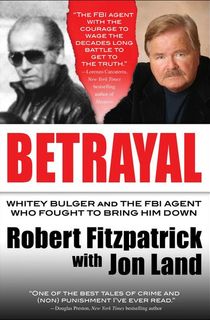
Betrayal
With more than 20 years in the FBI under his belt, Robert Fitzpatrick was involved in a number of major cases, including the notorious “Mississippi Burning” case of 1964 and the investigation into the assassination of Martin Luther King, Jr.
As described in this “stupendous read,” however, one of his biggest struggles was against corruption within his own agency, as he sought to capture the elusive Whitey Bulger.
The result is a “page-turner of the highest order. You will not be able to put this book down—guaranteed” (Douglas Preston, New York Times-bestselling author of Impact).
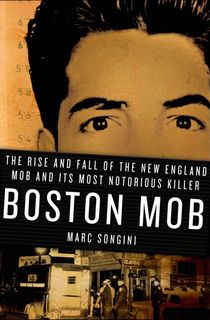
Boston Mob
Whitey Bulger’s rise to power was only one part of a larger tapestry of organized crime in New England.
The tapestry in question is one in which journalist Marc Songini unpicks in this “stark reminder that the tropes and cliches familiar from countless books and movies about organized crime have their origins in bloody realities” (Boston Globe).
Following the career of hitman and boxer Joseph “the Animal” Barboza, Songini’s book charts decades of organized crime in Boston, including the rise and fall of Whitey Bulger.
As the New York Daily News hails, “It’s not a pretty story, but it is fascinating reading.”
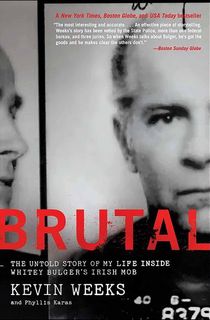
Brutal
Kevin Weeks was one of Whitey Bulger’s closest associates in the Winter Hill Gang and, after his arrest in 1999, one of the chief witnesses against Bulger, FBI agent John Connolly, and Stephen Flemmi, one of Bulger’s right-hand men.
As the Boston Sunday Globe says, Weeks has “got the goods” on Bulger, and in this “absorbing” (Deseret Morning News) book, originally written while Whitey Bulger was still on the run, he brings those goods to the public for the first time, providing a detailed and behind-the-scenes look at life inside Bulger’s organized crime family.
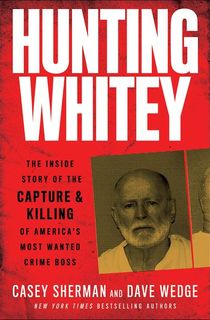
Hunting Whitey
Written with access to exclusive prison letters and based on interviews with dozens of people connected to Whitey Bulger’s life, capture, incarceration, and death, “Hunting Whitey is a tour de force into the life and death of one of America’s most infamous gangsters and offers a gritty glimpse into the soul of a pathological killer” (Providence Journal).
While many accounts of Bulger’s life focus on his time as the head of the Winter Hill Gang, Hunting Whitey investigates his time as a fugitive, his capture, and his brutal murder behind bars.
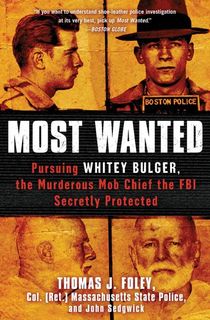
Most Wanted
“If you want to understand shoe-leather police investigation at its very best,” raves the Boston Globe, “pick up Most Wanted.” As the head of the Massachusetts State Police, Thomas J. Foley spent 20 years in pursuit of Whitey Bulger.
That being said, he was often foiled by the very FBI agents who were supposed to be helping him in his investigation.
Now, he tells the story of the pursuit of Bulger and the FBI agents who abetted him, including former FBI agent John Connolly, who was eventually sentenced to 40 years in prison for his handling of Whitey Bulger’s case.
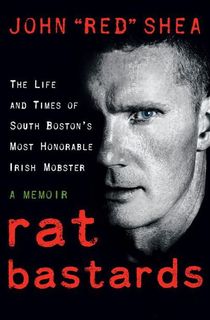
Rat Bastards
Helping Whitey Bulger stay out of jail was a “code of silence” practiced by many within the Boston mob. Among them was John “Red” Shea, an enforcer in Bulger’s operation who ultimately did his time without turning informant.
Now, he tells his own story in this “bawdy page-turner” that is a “slick read dripping with the underworld holy trinity of sex, drugs, and violence” (Publishers Weekly).
Besides a firsthand account of life in Boston’s Irish mob, it is also a “dish-a-thon on Whitey Bulger,” according to the Boston Herald, giving a rare glimpse at Bulger’s world from the inside.
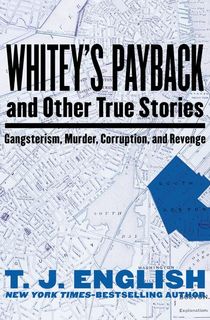
Whitey's Payback
Hailed as “one of America’s foremost authorities on the recent history of crime,” Whitey’s Payback and Other True Stories is culled from decades of writing by T. J. English. English has written not only nonfiction books about modern crime, but also episodes of gritty cop shows like NYPD Blue and Homicide: Life on the Street.
Besides several anecdotes about the life of Whitey Bulger, Whitey’s Payback features sixteen true stories of “gangsterism, murder, corruption, and revenge,” culled from some of the best of English’s extensive journalism.
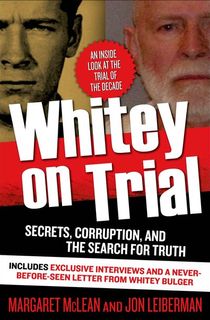
Whitey on Trial
Jon Leiberman was an investigative journalist who spent years traveling the world with the FBI’s Whitey Bulger task force. Margaret McLean was a prosecutor and legal analyst who was present for every day of Whitey Bulger’s trial.
Together, they bring a detailed firsthand account of that trial to the page, including an exclusive letter written by Whitey Bulger to McLean immediately after his conviction.
The result is “truly an inside and compelling view of a legendary trial” and “a must-read for true crime lovers” (John Walsh, creator and host of America’s Most Wanted).
Featured image: Wikimedia Commons and Wikimedia Commons
